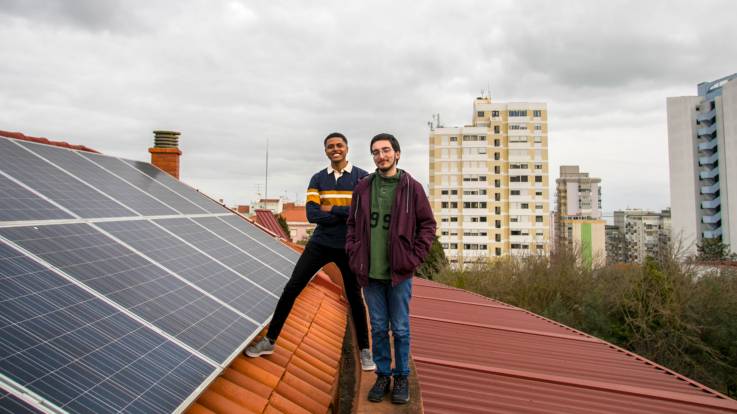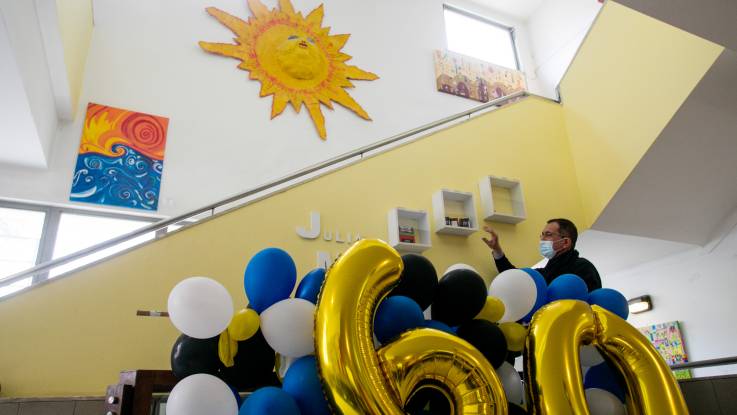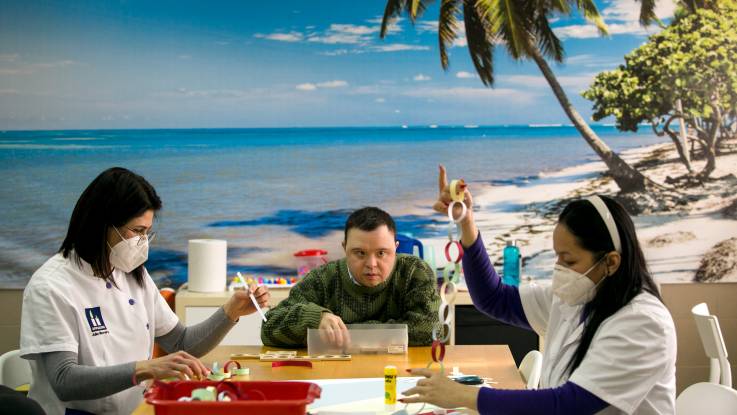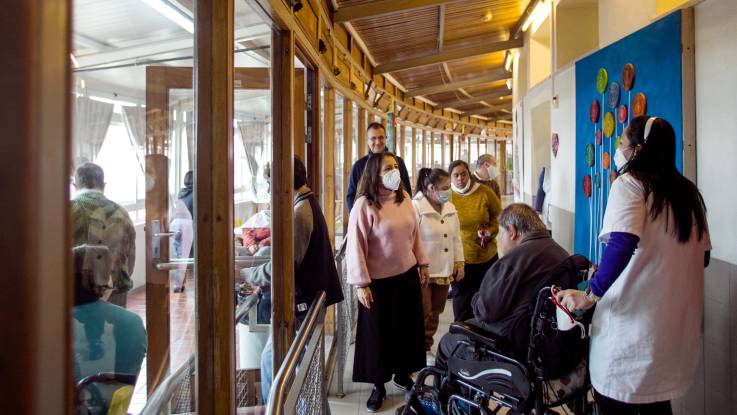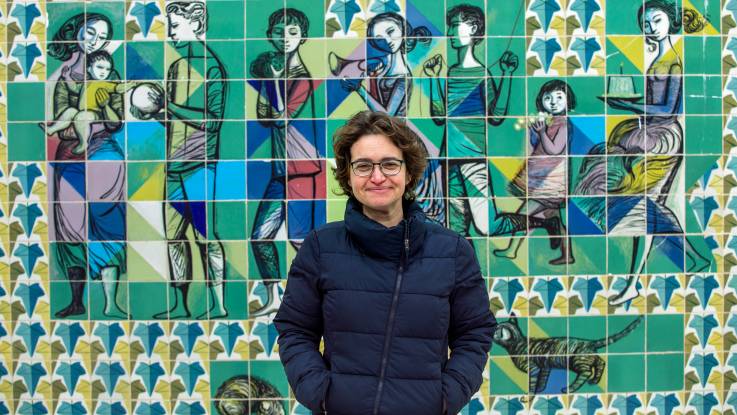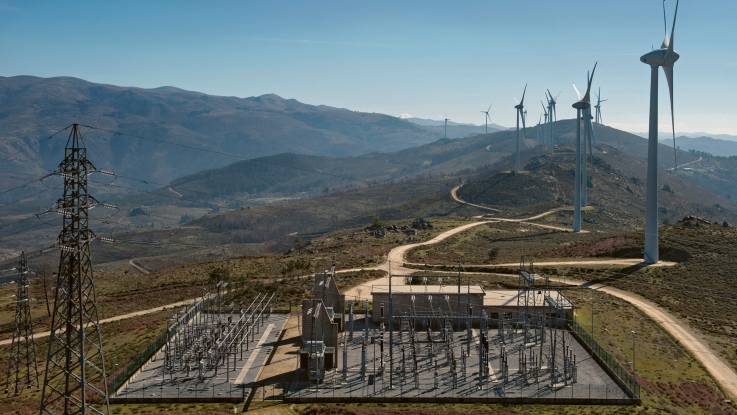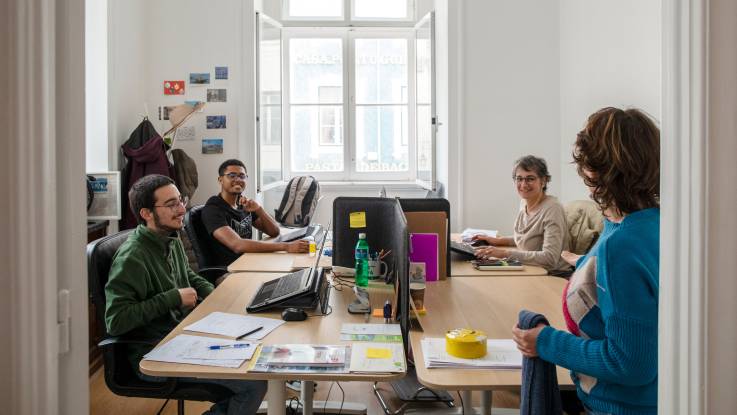Solidarity through sunlight
A report by Svenja Beller
Cooperative solar panels on the roofs of social facilities in Portugal show how citizens’ energy initiatives promote solidarity and community spirit.
It is an unusual day in an unusual winter when João Braga Lopes and Alekson Dias da Luz lead us up a narrow stairway to the roof of this facility for people with disabilities. They open the door to the outside; today the sky above is overcast – a very rare thing during these past few weeks. This winter has been extraordinary, with the clouds seemingly reluctant to shed any rain. Portugal is suffering from an extreme drought, with more than 90 percent of the country experiencing water shortages – and that in the middle of winter, when downpours are normal and expected.
Lopes and Luz, both in their mid-20s, are members of Lisbon-based energy cooperative Coopérnico. The cooperative predicted droughts of this kind years ago, when the Portuguese government allowed the construction of one hydropower dam after another. In early February 2022, five of the country’s approximately 60 hydroelectric plants had to close because their reservoirs were drying up. In some of these reservoirs, the waters disappeared to reveal the ruins of villages that were flooded to build the dams.
Social facilities go solar
The members of Coopérnico derive little satisfaction from being right about the water crisis – but they are happy to be able to offer a solution. The collective relies on an energy source that will not run dry in times of drought – the sun. The roof where Lopes and Luz are now standing is home to 122 solar modules. They usually shine brightly in the sunshine, but today they only gleam faintly in the pale light that seeps through the grey clouds – funny how things don’t seem to work when someone’s watching! In full sunshine, this solar facility can generate 30 kWh of electricity – that’s the amount needed by four Portuguese families with two children each. The electricity is fed into the public grid – for the time being, at least. In a few years, the centre for people with disabilities will be able to use the electricity itself.
Fourteen people live in Centro Júlia Moreira, and another 81 are cared for and work here during the day. The pink-hued building is situated in western Lisbon, in the Penha de França district, far from the sophisticated square Praça do Comércio in the city centre, the restaurants and bars in the winding cobbled lanes, and the popular viewpoints where street musicians entertain tourists. You won’t find any tourists in this part of town, with its plain and austere tower blocks and quiet residential streets echoing with the calls of pigeons and seagulls. Centro Júlia Moreira is part of the Associação Portuguesa de Pais e Amigos do Cidadão Deficiente Mental (Portuguese Association of the Parents and Friends of Mentally Disabled Citizens), whose emblem consists of two candles, one with a large flame and the other with a small flame. The message is clear: the strong help the weak. The association runs five institutions, including vocational training centres and a day nursery. And on the roofs of each one, solar modules are busy collecting the usually copious amounts of sunshine.
A decade of commitment to the energy transition
That is Coopérnico’s idea of a decentralized and socially responsible energy supply. The energy cooperative is the first, and until now only, of its kind in Portugal. It was founded in 2013 by Nuno Brito Jorge, who had recently returned from Barcelona, where he’d learned about the Catalan energy cooperative Som Energia. There was nothing comparable to that in Portugal, and so Brito Jorge gathered 16 friends and colleagues together, many of whom are environmental activists, to found the first energy cooperative in the country. One of those people was Ana Rita Antunes. At that time she was working for Portuguese conservation organization Quercus, now she is Chief Coordinator at Coopérnico. When asked to describe her duties, she laughs… “I do everything!” she says.
The cooperative received start-up funding from other energy cooperatives in Belgium, the Netherlands and Spain. The cooperative was organized by REScoop, the European federation of citizen energy cooperatives. Coopérnico’s goal was to combine climate-friendly electricity generation with social projects. To do so, it sought out social institutions like Centro Júlia Moreira so that it could install solar panels on their roofs. The agreement is fairly straightforward: Coopérnico pays the institutions a monthly rent for the roof area, and after 15 years the institutions can use the plant’s electricity themselves.
I am very motivated to do something for the good of society.
In the meantime, Alekson Luz, who is responsible for the technical monitoring of Coopérnico’s solar installations, is taking readings of the performance of the rooftop modules. “Pretty low today,” he says. That’s no surprise, given all those clouds. Next, Lopes and Luz – whose name appropriately translates as “light” – check the transformers. These are attached to a wall in the attic, behind another door. A colourful bundle of cables leads from the transformers up to the modules. Luz is pleased to discover there are no error messages. If problems do crop up, he is informed via an app. He doesn’t have to head out to the installation himself but can assign a local technician to go and fix the problem. He rarely visits the facilities in person – he’s actually only here today for our benefit. Luz and Lopes have worked with Coopérnico for one year, out of conviction and commitment to the cause. “I am very motivated to do something for the good of society,” says Lopes. “By pooling forces, we are taking power out of the hands of the big companies. And solar energy is the great hope for the energy transition.” Up on the roof, the two colleagues can see as far as the Tejo, the broad river that flows through Lisbon.
Project partners become energy companheiros
Two storeys down, we meet Luís Besugo, who is responsible for the association’s development. The room’s walls are adorned with photographs of the centre’s inhabitants and the colourful collages they have made. On a cupboard is a picture of a rainbow with the words “Vai ficar tudo bem” – “Everything will be fine.” Besugo greets us and tells us about the partnership: “The projects in our facilities were among the first Coopérnico initiated. That was in 2014.” Coopérnico first contacted Besugo two years previously, a year before the official founding of the cooperative. Besugo was immediately persuaded of the project’s value and promptly became a member of the cooperative himself.
“I thought it was a good idea straight away,” recalls Besugo, a tall man with friendly eyes behind rimless spectacles. “Our institution wants to work for the good of society,” he says. “And contributing to climate change mitigation is certainly a way to serve society.” For Besugo, therefore, promoting solar energy is a profoundly social obligation. He and his colleagues wasted no time: little more than a year after the initial contact, the panels were in place on the roof and the facility was earning additional income from the rent.
Finding roofs is the biggest problem.
Not every facility is so decisive. ”When I first started working for Coopérnico, I thought the major issue would be getting hold of enough money,” says project coordinator Antunes. ”But I was wrong. Finding roofs is the biggest problem.” And yet any institutions that make their roofs available don’t have to pay a single cent for the solar plants. Quite the contrary: they receive rent for a currently unused surface and, after 15 years, their operating costs decrease significantly, when they are able to use the electricity from the modules themselves.
Antunes’ explanation for why so many facilities reject Coopérnico’s offer is that opting to have the photovoltaic plants installed is a decision for the next 25 years, as that is the average lifetime of the modules. ”Many people are nervous about making such a long-term commitment.” And some people find the panels ugly. ”But how beautiful is the chimney of a coal-fired power station?” asks Antunes in exasperation. Obviously too few people have recognized the urgency of the need to switch to renewable energy sources. Antunes takes a deep breath. That’s something she does fairly often, she says, as this topic is particularly vexing.
Driving the energy transition with the handbrake on
This Thursday afternoon, Antunes has come to Biblioteca Orlando Ribeiro in the district of Telheiras in the far north of the city. The white-painted library has tables and chairs set out in its inner courtyard. Antunes was invited here by members of a local citizens’ initiative that have requested her advice as they would like to found an energy collective. The initiative aims to produce and manage its own energy, sharing the costs and the profits. In 2019, the Portuguese government passed a law to allow the creation of such energy collectives. “But to this day there is not a single one because the law is so poorly drafted,” complains Antunes. The legislation is too complicated, she says; no one can make head nor tail of it – yet another reason for Antunes to take a deep, slow breath. She believes that the government is not doing enough to promote the transition to a truly sustainable, democratic and socially responsible energy system.
And yet, Portugal is considered an energy transition role model by much of Europe. After asserting that it would phase out coal power by 2030, the Portuguese government brought that goal forwards to 2023 and finally to 2021. In January 2021, the former state utilities company Energias de Portugal (EDP), which was privatized some years ago, decommissioned the power station in Sines in southern Portugal. In November of that year it shut down the country’s last coal-fired power station, Pego, in the centre of the country. EDP says it brought the dates forward due to the increased cost of European emissions trading and higher taxes.
With this move, Portugal became the fourth country in Europe to eliminate coal after Belgium, Sweden and Austria. Germany does not plan to finally bid farewell to coal until 2035. In late 2021, Portuguese energy agency Adene reported that 73 percent of Portuguese electricity is generated from renewable sources, with the rest coming from gas-fired power plants run on imported gas. Portugal has no gas, oil or coal deposits; fossil fuels are delivered by ship to this country on the southeastern edge of Europe.
In 2020, most renewable energy in Portugal came from wind and water. They each had a 40 percent share. Biomass had a 12 percent share. But solar energy had only 5.5 percent, which seems absurd in a country where the sun is nearly always shining. “But it’s not the hours of sunlight that are decisive,” says Antunes. “It’s the political measures.” Most government assistance for solar power development is going to big solar parks in the hands of corporate investors. Currently, they are delivering twice as much energy as smaller plants.
For a brief period in 2008, Portugal’s first solar park was the largest in the world, with a capacity of 46 megawatts. Now, the next mega-project is in the pipelines – and it’s the source of much controversy. Construction of a new solar park in the central Portuguese district of Portalegre will require the felling of more than a thousand cork oaks. But these trees enjoy protected status in Portugal and may only be chopped down if they are sick or dead. Local inhabitants are therefore protesting vociferously against the park’s construction.
Coopérnico seeks an alternative path
That is not how Coopérnico envisages the energy transition. “We have to get the people on board,” says Antunes. And the cooperative is showing how that can be done. Since its founding in 2013, it has gained more than 2,300 members, who are encouraged to help shape Coopérnico’s strategy. Via local groups spread across the country, they can, for instance, publicize the cooperative’s work and goals, get their electricity from the cooperative, or invest in new projects.
And those investment schemes can work remarkably well, as one example from late 2020 shows: within five minutes, twelve members were able to finance a solar project worth €22,000 in Tavira on the southern coast of Portugal. They receive a three-percent return on every investment. This way, Coopérnico has been able to realize 32 projects, with a total investment volume of more than €1.8 million. Since Lisbon’s government reduced the feed-in compensation for solar energy from €100 to €45 per megawatt hour in 2019, the cooperative no longer initiates projects that feed energy into the grid, as it simply isn’t worth it financially. Instead, the institutions in the current seven projects use the solar power themselves – as does the facility in Tavira. There, a day nursery and crèche now use the electricity generated by the solar plants on their roofs.
People here are still not used to getting involved in democratic processes.
The reduced feed-in tariff has made it even more difficult for the cooperative to find partner institutions because using the electricity oneself is not always the best solution. For instance, sports facilities that are primarily used in the evenings would have to temporarily store the electricity generated during the day and then feed it back in again – but electricity storage systems are still very expensive.
Despite obstacles like this, Coopérnico is continuing to grow. In 2016 the cooperative was able to pay back its start-up funding to the other European energy cooperatives. Last year, it was even in a position to help new Greek cooperative Hyperion with initial funding. But, in comparison to other cooperatives in Europe, Coopérnico is still small in scope. In Germany, more than 800 energy cooperatives with a total of around 200,000 members are shaking up the electricity market. Antunes assumes that there are cultural reasons Coopérnico has thus far failed to inspire any emulators in Portugal: “Our democracy is only 48 years old. People here are still not used to getting involved in democratic processes.”
Energy poverty, and how to escape it
And yet it is precisely in Portugal that many people are in need of urgent financial assistance or self-generated energy. Portugal is one of the European countries worst affected by energy poverty. Of course, that is felt particularly strongly during winter. Portuguese homes are poorly insulated and rarely have central heating. Most people heat intermittently at moments of greatest need with small fan heaters or electric fires. According to an EU survey, almost a fifth of the Portuguese population are unable to keep their living spaces sufficiently warm in the wintertime. Only in Latvia, Bulgaria, Cyprus and Turkey are the people worse off.
Electricity prices are high in comparison to the low average wage. In response, last year the government introduced a special social electricity tariff for low-income households. Antunes believes that is not the right approach: “It’s like being given money to buy medicine that treats the symptoms of your disease without considering the causes,” she says. Coopérnico is calling for the creation of a national monitoring centre for energy poverty. It is also the Portuguese coordinator for the EU project Powerpoor, which offers support to low-income households, advising energy-poor citizens on how to change their energy use behaviour. Powerpoor also implements small-scale energy efficiency interventions and encourages the use of alternative financing schemes. Within the scope of the project, Coopérnico has also set up energy advice offices in the municipalities of Ermesinde, Mértola and Lisbon.
Each according to their means
And so the strong help the weak, as at Centro Júlia Moreira. Luís Besugo and his colleague Catarina Simões are doing a final round of the building. In the corridors, some of the residents fling their arms around them. “We’re not allowed to do that, because of Covid,” whispers Simões with a smile, and gently repositions a mask or two. In the foyer, a large gold number 60 shines out from the wall, surrounded by blue, white and yellow balloons – the institution has just celebrated its 60th anniversary. In one of the workrooms, a group of people are putting together plastic parts for an electronics firm, in the next another is painting pictures for a company that manufactures lifts – these are intended as gifts to say sorry to people who have been stuck in the company’s lifts. And in the typography workshop, a few people are making paper tags for Portuguese airline TAP. Each according to their means.
In seven years, the solar energy from the institution’s rooftop will help power its lighting and the radios that are on in the rooms nearly all day long. That should greatly reduce the centre’s high electricity bills. Simões’ only regret is that they are not able to explain the project properly to the mentally disabled people who live and work here, as it would be too complicated for them. But a large papier-mâché sun in the stairwell is a symbol of what is happening up on the roof.
The solar plant on top of this building is still little more than a nucleus for the dream of a decentralized, sustainable and socially responsible energy supply that Coopérnico is striving towards. So long as this is the only energy collective in Portugal, it is likely to remain nothing more than a dream. But Ana Rita Antunes and her comrades do not allow themselves to become discouraged. It was not so long ago that the Portuguese people peacefully freed themselves from a dictatorship. That historic moment is known as the Carnation Revolution – maybe the next milestone will be a solar revolution!
Translated from the German by Heather Kimber / Babelfisch Translations. You can also read the report in German.
Related stories
-
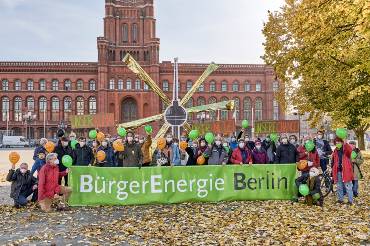
A beacon for Berlin
BürgerEnergie Berlin has been fighting for climate protection and the participation of citizens in the city's energy networks for over a decade.
